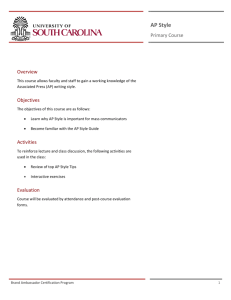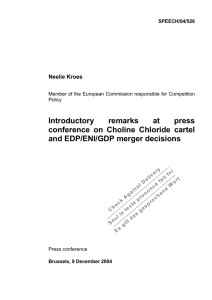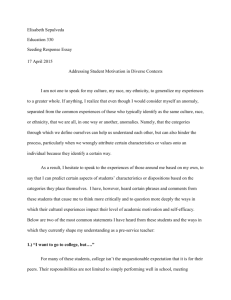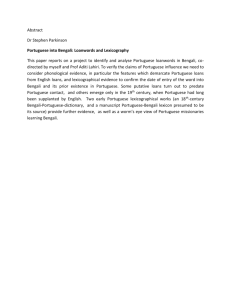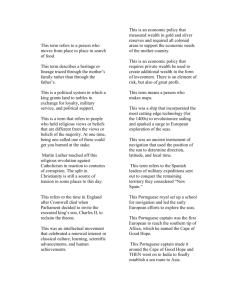Current Trends in Teacher Performance Evaluation in Portugal
advertisement
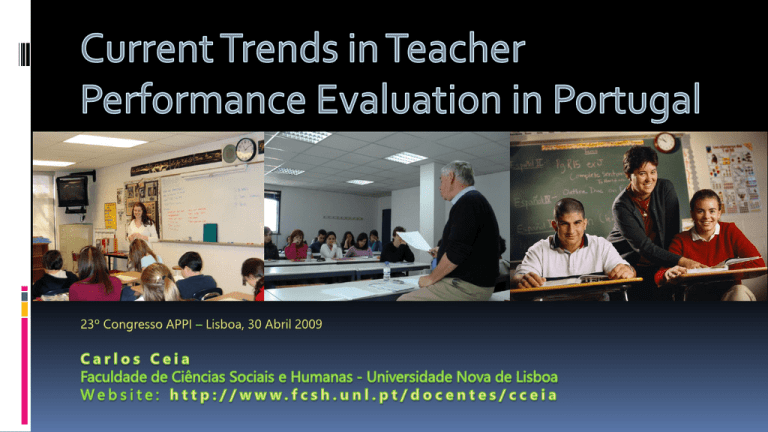
_________________________________________________________________________________________________________________________________________________________________________________________________________________________________________________ We have professionals in our Basic and Secondary schools teaching English as a Foreign/Second Language with completely different educational backgrounds, tough they all teach the same curriculum, have the same income, and are being currently evaluated with the same criteria. 2 _________________________________________________________________________________________________________________________________________________________________________________________________________________________________________________ We still do not have an effective general system of degree accreditation. Professional associations of some of the regulated professions have started and run their own accreditation systems, but this does not include teacher education. This gloomy scenario of deregulation of the whole system of Portuguese higher education means that our EFL teachers finished their courses and pre-service education and have applied to the same job with no distinction whatsoever of their higher education profile. 3 _________________________________________________________________________________________________________________________________________________________________________________________________________________________________________________ If the initial teacher education varies from 4 to 6 years in the past two decades, the curricular profile of those courses are even more diverse (I have counted 64 different BA courses in Modern Languages available before the implementation of the Bologna process), and the professional conditions that a graduate could expect, once completed the pre-service education, from the legal framework were frustrating. 4 _________________________________________________________________________________________________________________________________________________________________________________________________________________________________________________ The most problematic situation was always the fact that a graduate in Modern Languages (formerly designated Línguas e Literaturas Modernas, and currently Línguas, Literaturas e Culturas), with a specialization in Portuguese and English (the most popular specialization) was not placed at the same career level as a graduate in English and German, due to an outdated and bizarre sheltering of those who graduated in the old course of Germanic Philology. 5 _________________________________________________________________________________________________________________________________________________________________________________________________________________________________________________ In 2006, a new law (DL 27/2006) corrected this iniquity, here simplified, and created a single group designated English. But a brand-new law (DL 43/2007) has changed, again, the curricular framework of the EFL teacher education, and, from here, the old bizarre sheltering pictured in the specialization in Germanic Philology has been restored. 6 _________________________________________________________________________________________________________________________________________________________________________________________________________________________________________________ 7 _________________________________________________________________________________________________________________________________________________________________________________________________________________________________________________ The consequences for this Law Act [ are catastrophic: It is unfounded, from all viewpoints and scenarios, the establishment of a scientific domain called: “Teaching of Portuguese and Foreign Language, except English”. No one could think of a more bizarre exception. This Law contradicts another Law (DL 27/2006) that is currently regulating the teaching habilitation groups, where English is placed as a single discipline (Group 330, for “3º Ciclo” and Secondary Education). 8 _________________________________________________________________________________________________________________________________________________________________________________________________________________________________________________ The consequences for this Law Act [ are catastrophic: The BA in Portuguese and English Studies was eradicated from this Law and no one knows why. Those who hold a degree in English Studies at BA level (180 ECTS, as in any other BA bilingual course) will never be accepted as candidates to the master in teaching foreign languages. They are the graduates who hold more credits in English but they were mysteriously left out of postgraduate teaching courses. This Law ignores the Common European Framework of Reference for Language Learning and Teaching, and does not agree with several decisions of the European Commission for teacher education in foreign languages. 9 _________________________________________________________________________________________________________________________________________________________________________________________________________________________________________________ The new national master courses – inevitably conceived under the regulations of the DL 43/2007 – for pre-service teacher education have very different curricular outlines. All that is required is a public defence of a final report of what has been done during the pre-service activities (“Prática de Ensino Supervisionada”). These curricular programmes have been planned to protect the strictly pedagogical contents of teacher education. This has been an historical miscalculation in the Portuguese educational system for the past thirty years. 10 _________________________________________________________________________________________________________________________________________________________________________________________________________________________________________________ A much different curricular framework has been adopted in foreign countries for pre-service teacher education and teacher performance evaluation. I will use the United States and the United Kingdom as comparative terms to Portuguese policies in this area. A major difference is the balance between scientific learning and pedagogical learning during pre-service education. When defending research-based teacher education I am not claiming a cutback of pedagogical learning. I believe that both should exist either in preservice or in in-service teacher education, but the focal point should be the former and not the latter. 11 _________________________________________________________________________________________________________________________________________________________________________________________________________________________________________________ The University of Maryland requires that “Candidates for the in the M. Ed. Program in Foreign Language Education must meet the following degree requirements: Completion of a minimum of 30 semester hours of the prescribed course work at the graduate level, Completion of one fully approved Seminar Paper written under the direction of a faculty member in the program, and A passing score on six (6) hours of a written comprehensive examination at the end of coursework. The examination covers all the major areas of study and is given twice a year, in early fall and early spring.” 12 _________________________________________________________________________________________________________________________________________________________________________________________________________________________________________________ In many countries, it is a major standard in teacher education to require a profound knowledge of the most recent advances of the research in the subjects planned for teaching. Hannele Niemi, from the University of Helsinki, sums up what is needed: The necessary prerequisite is that teacher education rests on a research- based foundation with three basic conditions: Teachers need knowledge of the most recent advances in research for the subjects they teach. In addition, they need to be familiar with the newest research on how something can be taught and learned. 13 _________________________________________________________________________________________________________________________________________________________________________________________________________________________________________________ [...Hannele Niemi...] Teacher education in itself should also be an object of study and research. This research should provide knowledge about the effectiveness and quality of teacher education implemented by various means and in different cultural contexts. The aim is that teachers can internalise a research-orientated attitude towards their work, which means that teachers take an analytical and open-minded approach to their work, draw conclusions based on their observations and experiences, develop teaching and learning environments in a systematic way. It is useless to compare these goals with those inscribed in DL 43/2007, which is a law that entirely disrespects the dimension of research-based teacher education. 14 _________________________________________________________________________________________________________________________________________________________________________________________________________________________________________________ We have a system of professional certification that relies entirely in under- graduation degrees and in pre-service teacher education. Foreign language teachers are not certified otherwise during their entire career. In the United Kingdom, teacher certification is carried out by UCLES (University of Cambridge Local Examinations Syndicate) and through the exams of Trinity International Examinations Board of Trinity College, in London. The United States have founded the National Board for Professional Teaching Standards (NBPTS), a national and independent agency. “NBPTS is an independent, nonprofit, nonpartisan and nongovernmental organization. It was formed in 1987 to advance the quality of teaching and learning by developing professional standards for accomplished teaching, creating a voluntary system to certify teachers who meet those standards and integrating certified teachers into educational reform efforts.” http://www.nbpts.org 15 _________________________________________________________________________________________________________________________________________________________________________________________________________________________________________________ Portugal has now a system of certification for teaching that relies only in an exceptional test – still to be put in practice and regulated – but so powerful that it can determine if the graduate teacher will begin his/her career or not. In successful, the new Portuguese teacher will be tested in the years to come following the already announced teacher performance evaluation method. But none of these – professional certification and performance evaluation – was ever conceived under a conceptual framework for professional standards. To be certified as a future teacher and to be evaluated as an in-service teacher are two instances that should be connected. 16 _________________________________________________________________________________________________________________________________________________________________________________________________________________________________________________ In the United States, the NBPTS can proceed to teacher certification because we know, before hand, that national recognized standards have been fixed referring to competences for teaching a foreign language, for example. We do not have such referrals as the “World Languages Other than English/Early Adolescence through Young Adulthood” 17 _________________________________________________________________________________________________________________________________________________________________________________________________________________________________________________ NBPTS: “World Languages Other than English/Early Adolescence through Young Adulthood” If a candidate wants to become a FL teacher, he/she will be tested not through classical written examination in educational topics, but through two fundamental competences: Candidates submit a portfolio comprised of three classroom-based entries, including two videos, to document the candidate's teaching practice. The fourth portfolio entry documents the candidate's work with students' families and the community as well as work within a professional community. Candidates must make an assessment center appointment where they will respond to six prompts focused on content knowledge. Candidates are allowed up to 30 minutes to respond to each prompt. This model praises the academic background, follows the methods already used by the candidate during his/her graduation, believes in the practice of portfolio presentation, does not undervalue the linguistic competences of the candidate, and does not raise the suspicion that the institution where the candidate has graduated might not be idoneous. 18 _________________________________________________________________________________________________________________________________________________________________________________________________________________________________________________ Internationally, there are good practices from where we can start, for instance the “The framework of professional standards for teachers set out below defines the characteristics of teachers at each career stage. Specifically it provides professional standards for: • the award of Qualified Teacher Status (QTS) (Q) • teachers on the main scale (Core) (C) • teachers on the upper pay scale (Post Threshold Teachers) (P) • Excellent Teachers (E) • Advanced Skills Teachers (ASTs) (A) “ 19 • evaluated by the director of the school • evaluated by the head of department 20 In the first place, such policy does not place performance evaluation under the supervision of current practicing classroom teachers in the same scientific area, as it should be in all circumstances. 1 In the second place, such policy needs a strong system of professional certification prior to any form of performance evaluation in a national framework. 22 We are missing, in my view, teacher performance that is the result of effective teacher education: What is the nature of knowledge emerging in class? What is being taught? How teachers adapt knowledge to specific characteristics of students? How teachers deal with the learning environment they are working in? 3 _________________________________________________________________________________________________________________________________________________________________________________________________________________________________________________ We have neglected to design a system for the evaluation of teachers that can be viewed as an accurate organization of all aspects involved in the profession. Michael J. Dunkin on the evaluation of teachers' effectiveness in Australia: “There are five main preliminary matters involved in arriving at a system for the evaluation of teachers. The first is the purpose of the evaluation; the second is the target category of teachers to be assessed; the third is the conception of teachers' work that is adopted; the fourth concerns the dimensions of teaching quality about which judgments are to be made; and the fifth is the approach to establishing the validity of the assessments.” ("Assessing teachers' effectiveness”, Issues in Educational Research, 7(1), 1997, 37-51, available at: <http://www.iier.org.au/iier7/dunkin.html>) 24 _________________________________________________________________________________________________________________________________________________________________________________________________________________________________________________ We need to decide, prior to anything else, which type of evaluation we want to introduce in our system: A) Evaluation to encourage the professional growth and development of teachers; or B) Evaluation to select, graduate and hire teachers. It seems to me that anything else is expected from the current Portuguese system than promoting a system of evaluation that ignores growth-oriented methods that would affect all teachers instead of having a method that wants to identify and give merit to the best ones only. A language teacher, for instance, who depends so much of language competence and performance, needs an evaluation system that will help him/her to improve his/her skills. 25 _________________________________________________________________________________________________________________________________________________________________________________________________________________________________________________ I agree with Michael J. Dunkin’s conclusion that “issues and methods associated with teacher evaluation depend upon the stage of professional development attained by the teachers to be evaluated. Graduates of preservice teacher education programs seeking certification or licensing would not fairly have the same standards applied to them as would experienced teachers seeking promotion to senior teacher positions. Clearly, the assessment of preservice teachers would need to be considered separately from the assessment of novice, inservice teachers, who would need to be considered separately from experienced teachers seeking career awards, promotion or merit pay.” 26 _________________________________________________________________________________________________________________________________________________________________________________________________________________________________________________ Teacher’s work in Portugal is never conceived by politicians as a craft or an art but rather as a labour that needs to be regulated. Creativity and innovation, effective improvisation and unconventionality in class is almost never rewarded or even recognized neither by formal regulations nor by evaluators. Everything in the current teacher performance evaluation regulations tends to the accomplished performance of the teacher as referring to standardised forms of teaching. The alternative model – when evaluation of teacher performance is conducted largely to ensure that proper standards of practice, including everything the teacher is adding to the benefit of instruction, are being employed − is not present. 27 _________________________________________________________________________________________________________________________________________________________________________________________________________________________________________________ We should take into consideration the three main dimensions of teacher quality: teacher effectiveness, teacher competence and teacher performance. At this moment, Portuguese policymakers have adopted paper-and-pencil tests of knowledge for professional certification of those graduates who finish in-service education (teacher competence evaluated only); it has introduced for the first time observational tools for the evaluation of teacher performance for in-service professionals; and it has tried in its first version to introduce the assessment of teachers' effectiveness through student achievement scores. We lack a system that is capable of integrating all dimensions in an adequate formula. 28 _________________________________________________________________________________________________________________________________________________________________________________________________________________________________________________ The Portuguese system has been developed under the belief that only a psychometric approach of single performances are valid, leaving aside extra knowledge about the teacher as a professional. In other words, what is evaluated is the teacher as an individual who can respond to administrative requirements and perform them correctly. The teacher as an intellectual performer is not taken into consideration. Who is the teacher whose performance we are observing? – it seems to me that this simple but critical question is being neglected. 29 _________________________________________________________________________________________________________________________________________________________________________________________________________________________________________________ In the USA, the NCTE (National Council of Teachers of English) has defined knowledge and pedagogical standards: NCTE knowledge standards: Teachers of English Language Arts need to know the following: 1. That growth in language maturity is a developmental process; 2. How students develop in understanding and using language; 3. How speaking, listening, writing, reading, and thinking are interrelated; [... 17 standards] NCTE pedagogical standards: Teachers of English Language Arts must be able to do the following: 1. Select, design, and organize objectives, strategies, and materials for teaching English Language Arts; 2. Organize students for effective whole-class, small-group, and individual work in English Language Arts; 3. Use a variety of effective instructional strategies appropriate to diverse cultural groups and individual 30 learning styles; [... 15 standards] _________________________________________________________________________________________________________________________________________________________________________________________________________________________________________________ In the English-speaking world, there are many exemplary models of teacher performance evaluation that could be used in Portugal. Example 1: Certificate in English Language Teaching to Young Learners (CELTYL) and Young Learner (YL) extension to the Certificate in English Language Teaching to Adults (CELTA) Cambridge CELTA Assessment, for instance, includes two components of assessment: 1) planning and teaching; 2) Classroom-related written assignments Links: CELTA regulations: http://www.cambridgeesol.org/exams/teaching-awards/celta.html CELTYL regulations: http://www.cambridgeesol.org/exams/teaching-awards/celtyl.html 31 _________________________________________________________________________________________________________________________________________________________________________________________________________________________________________________ A general purpose instrument of evaluation: Teacher Performance Evaluation (Jackson Public School District, Mississippi, USA) - The district has 59 schools: 8 high schools and a Career Development Center, 10 middle schools, 38 elementary schools, and 2 special schools. The handbook of this District in the USA has an introductory set of texts that give clear information on the philosophy of education, the philosophy of instruction and the philosophy of evaluation of the whole process of teacher performance evaluation. Links: http://www.jackson.k12.ms.us/content.aspx?url=/page/about& http://www.jackson.k12.ms.us/departments/human_resources/publications/teacher_eval.pdf 32 _________________________________________________________________________________________________________________________________________________________________________________________________________________________________________________ Performance-based teacher evaluation is a professional development key- phase for all teachers. Teacher evaluation of pre-service teachers works as a means of ensuring that they have or are developing essential teaching skills; in-service teachers are evaluated to ensure that teachers can evolve from that novice stage to proficient and expert stages. In a well-organized educational system, all teachers should have an annual professional development plan approved by the administration of the school they have a contract with. A national and all-purpose regulation has to exist, providing that the focus of teacher performance evaluation is the improvement of individual professional development, teaching practices and teacher effectiveness. 33 _________________________________________________________________________________________________________________________________________________________________________________________________________________________________________________ Job descriptions and evaluation forms must have specific performance criteria and standards, from where all phases of evaluation must be taken from. Decision-making is based on both classroom observation and teacher documentation on standards not observed. Self-evaluation and reflection are included. The ideal model is designed to assist in implementing both professional development plans and professional improvement plans. Specific forms of performance-based teacher evaluation should be designed to meet the characteristics of foreign language teachers, which are necessarily different from general or all-purpose forms of teacher performance evaluation. 34 35
